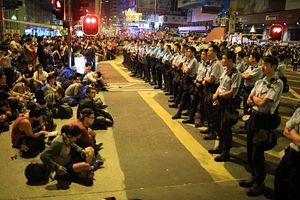The Rebalance authors Mercy Kuo and Angie Tang regularly engage subject-matter experts, policy practitioners and strategic thinkers across the globe for their diverse insights into the U.S. rebalance to Asia. This conversation with David Zweig – Chair Professor of Social Science and Director of the Center on China’s Transnational Relations at The Hong Kong University of Science and Technology, Vice President of the Center on China and Globalization in Beijing, and author of Sino-US Energy Triangles: Resource diplomacy under hegemony and Internationalizing China: Domestic Interests and Global Linkages, among many others – is the 35th in “The Rebalance Insight Series.”
The recent disappearances of key Chinese booksellers seem to indicate free press is under fire in Hong Kong. What larger forces, if any, underpin this tightening media control?
There are two schools of thought: One group believes that tightening control reflects a systematic effort by Beijing to limit Hong Kong’s freedoms and strengthen the state’s control of over this troublesome locality. The dramatic decline in the ranking of Hong Kong’s press freedom from 18th (2002) to 70th (2015) reflects that problem. A second view emphasizes Beijing is tired of rumor-mongering books that cross the border, undermining the Chinese Communist Party’s (CCP) legitimacy. Moreover, rumors suggest Gui Minhai – Hong Kong bookseller of Swedish citizenship – was soon to publish a book about Xi Jinping’s frolicking during his earlier days in Fujian Province. How could Xi incarcerate carousing cadres with accusations circulating that he too played around? But while China insists that it supports Hong Kong’s development, Beijing could do more by doing less. Surveys by the U.S. Chamber of Commerce in Hong Kong show that maintaining free flow of information is the number one issue for foreign investors.
Briefly assess the direction of rule of law in Hong Kong and its implications for political reforms in Greater China.
Occupy Central and the Mongkok riot has cast doubts about the rule of law in Hong Kong. But I agree with the Chairwoman of the Hong Kong Bar Association, Winnie Tam, who sees the unrest as “a blow to law and order,” but not necessarily “a blow to the rule of law.” Occupy Central reflects the willingness to move beyond peaceful demonstrations in the search for greater democracy, but does not challenge the “rule of law.” “Civil disobedience” accepts that this form of political participation breaks the law and its practitioners will be arrested. That is part of the pact under which people “civilly disobey.” Will such activity influence China? If the Pan-Democrats want Hong Kong’s example to promote democracy on the mainland, they should have accepted Beijing’s admittedly bad deal of a competitive election under “universal suffrage” between two to three pro-Beijing candidates. Permitting every city in China to allow universal suffrage and a competitive election for its mayor between a few CCP-selected candidates would have been a “great leap forward” on China’s road to democracy.
What major obstacles and opportunities face newly-elected Taiwan President Tsai Ing-wen in balancing cross-strait relations?
The Sunflower Movement changed Taiwan’s politics positively for President Tsai. She can resist China’s pressure to enhance interdependence, as moving closer to the mainland is now not possible in today’s Taiwan. Tsai does not recognize the “one China principle,” or the “1992 Consensus,” because in her mind there is “one China, and one Taiwan.” But she cannot say it publicly or repudiate the KMT’s agreements with mainland China without significantly harming cross-strait relations. But how to manage cross-straits relations without hurting economic ties dramatically? The slowdown of China’s economy may cause Taiwanese businessmen in China to look at the third option for Taiwan –increased exports to Southeast Asia – decreasing dependence on China. But Canada’s “third option” – a shift from excessive dependence on the U.S. which comprised 85% of Canada’s trade, to Europe – fell flat.
Tsai also benefits from the Sunflower Movement’s call for transparency in cross-straits negotiations. In her presidential campaign, Tsai said that the cross-straits dialogue should be based on democracy, public awareness and peaceful negotiation. And while the Taiwan Affairs Office of the Chinese State Council criticized this idea, aware that if Taiwanese are privy to the negotiations, serious opposition will prevent deeper integration –Tsai can insist on keeping her promises, preventing deeper interdependence.
Explain the process of “internationalizing” China.
Internationalization is the “expanded flow of goods, services, and people across state boundaries, increasing the share of transnational exchanges relative to domestic ones, along with a decline in the level of regulation affecting those flows.” Internationalization followed the process of “from point to surface.” Initially, China’s central government used bureaucratic controls to limit exchanges in a sector. But officials learned that only by facilitating cross-border transfers could they earn fees, creating few incentives to block transnational exchanges – what I call, “no flow, no dough.” Moreover, because first movers always benefited from speeding up internationalization, earning larger profits than those who followed, feverish efforts by individuals, organizations and localities intensified the pace and depth of internationalization whenever the state relaxed its controls.
How should U.S. presidential candidates understand the strategic importance of Hong Kong and Taiwan in U.S.-China relations?
The U.S. cannot enhance the strategic value of Taiwan, if that involves increasing Taiwan’s role as a military asset vis-à-vis Beijing. Despite calls by U.S. presidential candidates to upgrade U.S.-Taiwan ties significantly, presidential candidates talk tough on China but elected presidents respond to reality. Presidents Bill Clinton, Ronald Reagan and George W. Bush initially rejected enhanced ties with Beijing, but soon decided that working with China was necessary. Hong Kong and Taiwan’s strategic value to the U.S. lies in their democratic or semi-democratic systems, which stand in juxtaposition to China’s hardening authoritarianism. Citizens in both territories have strengthened their identities as “Taiwanese” or “Hong Kongers,” eschewing their identity as “Chinese.” Mainland pressure backfired, as many people in these two territories see their business elites getting rich, while their own salaries stagnate, housing prices become unaffordable, and media freedoms deteriorate.

































